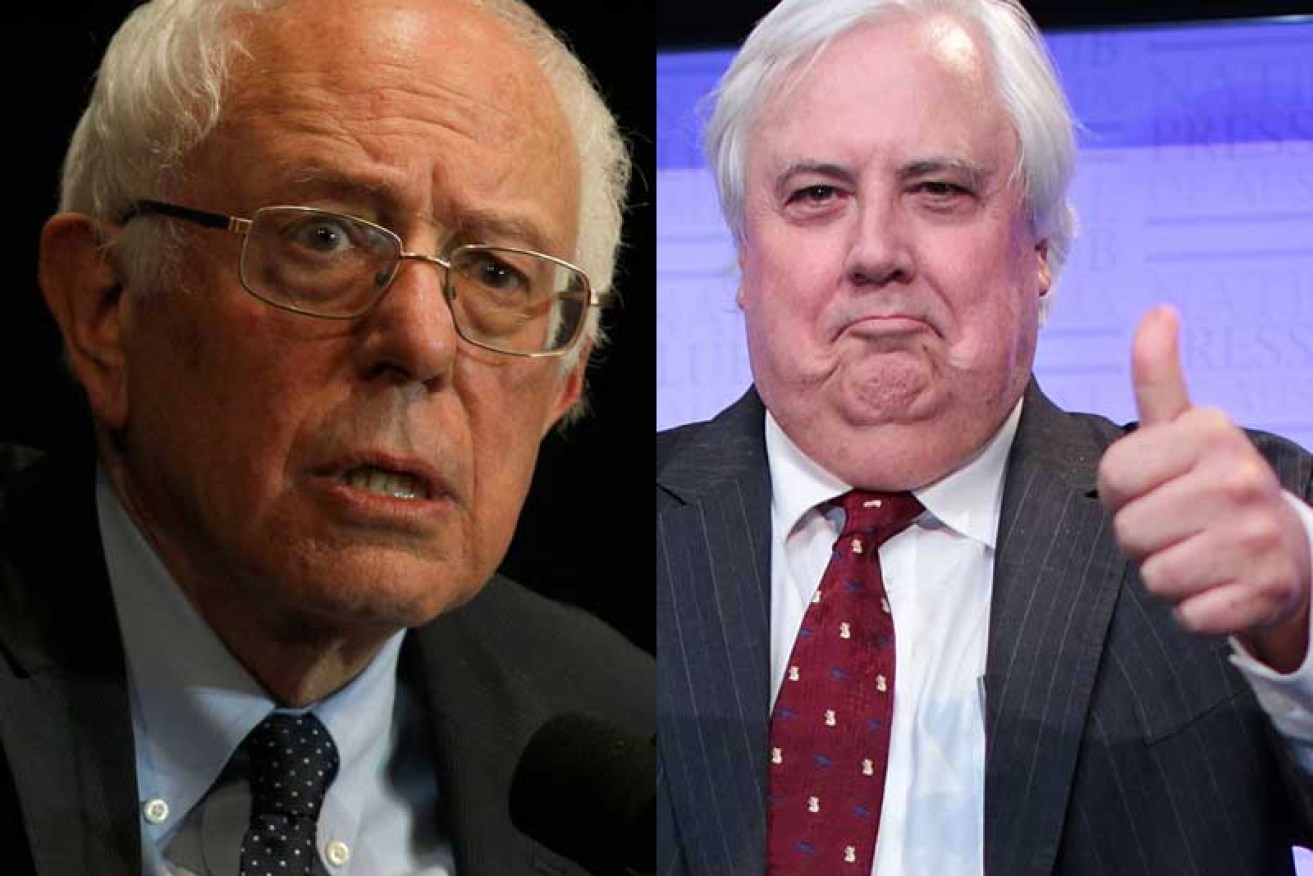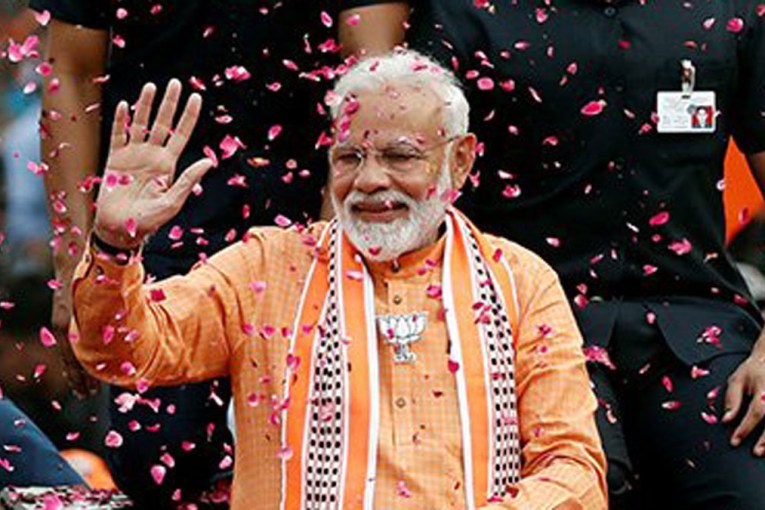Why Bernie Sanders could be USA’s Clive Palmer


Getty/AAP
Observers of the frequently bizarre spectacle that is US politics are closely watching a dark horse that has entered the race for the White House.
The presence of a rank outsider in the line-up for US President is not that unusual. But this one is of note because he’s showing potential to upset the carefully planned run of former First Lady, ex-Secretary of State, and front-runner for the Democrat candidacy, Hillary Clinton.
No, we’re not talking about Donald Trump but Bernie Sanders, the septuagenarian Democrat who’s vying with Mrs Clinton to be the Democrats’ candidate for the presidential election.
• Aussie entrepreneur Dick Smith to challenge Bronwyn Bishop
• Sarah Palin endorses Donald Trump’s presidency bid
• Obama thanks PM for combined terror efforts
At an age when politicians of a similar vintage are being urged to retire from Australia’s federal parliament, the ex-mayor, former member of Congress and currently serving Senator seems to have captured the imaginations and earned the approval of American voters in a way that no other politician can.
One opinion poll suggests Senator Sanders is the only potential presidential candidate with a higher approval than disapproval rating (38 per cent compared with 35 per cent), and another has him leading Mrs Clinton 60 per cent to 33 per cent.

Sanders has proven to have an affinity with both young voters and old. Photo: Getty
Apart from being a canny user of social media, it appears Senator Sanders’ main drawcard is his progressive policies. One media outlet describes the Senator’s philosophical approach as “helping working people and reducing the influence of the wealthy”.
According to those principles, the Senator advocates eradicating wealth inequality, protecting universal healthcare, raising the minimum wage, providing free tertiary education, increasing social welfare payments, giving women the right to have abortions, legalising gay marriage, and increasing taxes for the rich.
Voters also perceive him as authentic, which sets the wannabe president favourably apart from overly-polished soundbite politicians and those who seem to be one hairspray squirt away from immobilising themselves in lacquer.
Senator Sanders is particularly popular with young voters, tapping into their anxieties about the cost of education, earning a decent wage, social equity and saving the planet. One writer describes the nature of this support as a combination of admiration for his progressive conviction with a slightly condescending fondness for cranky senior citizens.
Can he attract – and retain – votes?
The real question, however, is whether such populist support will translate into actual votes, and whether those votes can be sustained over time.
If he were to find a quiet moment during the hectic nomination campaign schedule, Senator Sanders could look to our antipodean shores to learn how populist politics can cut either way.

Sanders is polling well against top rival Hillary Clinton. Photo: Getty
He may care to take note of the rise and fall of the politician we know as Clive, the apparently plain-talking and big-hearted man who at times has garnered kudos from university students, the sick, the old, environmentalists and refugee activists for standing up to the establishment, which at the time was the administration of Prime Minister Tony Abbott.
Granted, the self-described socialist Senator Sanders and the proud capitalist Mr Palmer would be worlds apart on the question of what involves the equitable distribution of capital within society. However, both men have sought to tap into the very real concerns of the disadvantaged, the poor and the weak.
In Mr Palmer’s case, voters seemed initially prepared to set aside any niggling concerns about the mining magnate’s business dealings outside the parliament or resulting potential conflicts of interest within it.
But this disquiet grew when the MP used his balance of power in the Senate to replace the Gillard government’s carbon tax with the Abbott government’s Direct Action Plan. Mr Palmer’s senators abandoned him among accusations of bullying and autocracy, and the parliamentarian lapsed into unforgivable sexist language to berate the PM’s chief of staff.
By this stage it became increasingly difficult for voters to ignore the fact that Mr Palmer would tell anyone what they wanted to hear, and that his parliamentary career has only ever been about looking out for Number One. As a result, support for the miner’s party has crashed from a high of 12.3 per cent at the WA Senate election re-run in 2014 to around 2 per cent now.
This low water mark is expected to dip even further since it has emerged that Mr Palmer funnelled money into his party’s coffers from his struggling Queensland Nickel operation, potentially denying sacked workers their entitlements.
Lessons to be learned?

Donald Trump could very well be opposite the Democratic candidate in the presidential race. Photo: Getty
Why is the political demise of Clive Palmer a lesson for Bernie Sanders? Because a politician who depends on perceptions of authenticity while promising to deliver on populist concerns may at some point be forced to trade one off against the other and be punished by disillusioned voters for doing so.
Clive Palmer undermined his big-hearted, straight-talking persona when he insisted on being party to political and policy decisions that benefited his business operations, and subsequently denied this was a conflict of interest.
Bernie Sanders will face a different but just as challenging test of his authenticity and intentions. He will need to convince supporters that he can deliver on the objectives of a life-long social activist while responsibly managing one of the world’s most important economies.
If Senator Sanders were ever to become President, trade-offs between the two would inevitably occur. And like Clive Palmer in that tiny parliament on the other side of the world, President Sanders’ future would depend on the extent to which he could convincingly argue that his integrity was not diminished by doing such deals.
Paula Matthewson was media adviser to John Howard in the early 1990s and then worked for almost 25 years in communication, political and industry advocacy roles. She is now a freelance writer and communication strategist. Paula has been tweeting and blogging about politics, the media and social media since 2009 under the pen name @Drag0nista.
You can read more of her columns here









